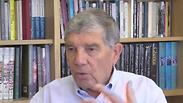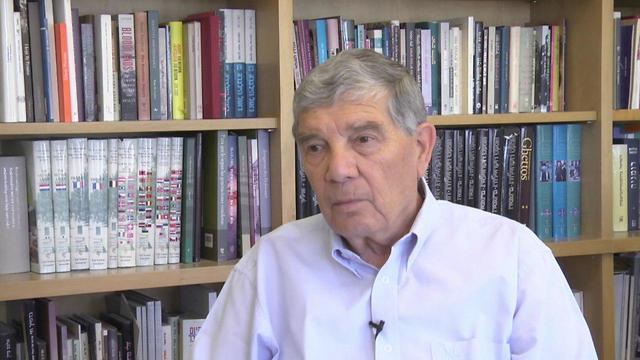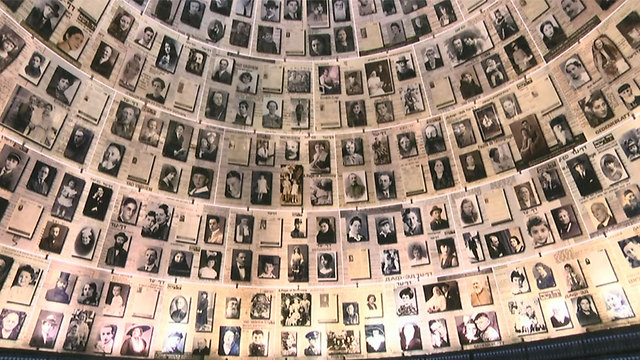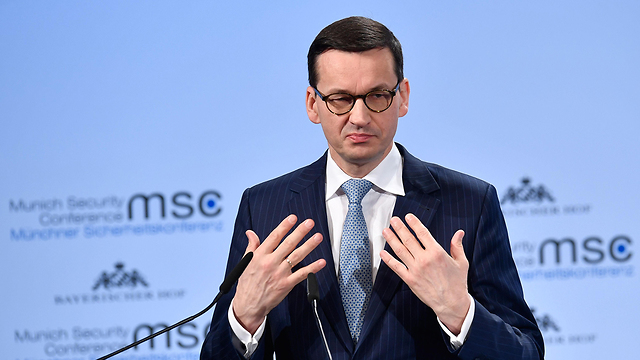
Yad Vashem head prepares for day when no Holocaust survivors remain
The day when we will no longer have living testimonies of the Holocaust's atrocities is approaching, but Avner Shalev believes it's still possible to convey the memory of the Holocaust to the next generation: 'There is no decline in the will to learn, the way to preserve the memory is to create meaning.'
The chairman of the Yad Vashem Holocaust Museum, Avner Shalev, knows that the day we will no longer have living testimonies of Holocaust survivors is near. He is determined not to let the memory of the Holocaust fade away by preserving it through art, poetry and written testimonies.
Shalev believes the best way to preserve this memory is to "help the youth create meaning from the memory, since only if they have meaning, the memory would last."
Holocaust Martyrs and Heroes Remembrance Day will begin on Wednesday evening with the main ceremony at Yad Vashem, which is led by Holocaust survivors who will tell their personal story. Other survivors will attend different ceremonies across the country and talk about the horrifying experiences they and their families went through during World War II.
In addition to special classes school students will attend on Thursday, hundreds of survivors will meet independently with young generations born after the Holocaust with the purpose of conveying one message—never forget.
Yad Vashem Chairman Shalev, 79, told Ynet about how the museum tries to find solutions to preserve the memory of the Holocaust once the last of the survivors parishes.
It's hard finding a man that holds this subject closer to heart more than Shalev. He has been the chairman of Yad Vashem for 25 years since finishing his military tenure as a chief education officer. Senior employees of Yad Vashem say that since Shalev took over the chairman position, the establishment has been revived. Shalev also came up with the idea of opening an international school that teaches about the Holocaust at Yad Vashem.
The school educates teachers from all over the country and the world how to make this issue accessible to students. "Teaching the Holocaust once we have no survivors among the living isn't something we've just started thinking about. This thought has been guiding me through everything I do here," says Shalev.
"Despite their crucial contribution to preserving the memory of the Holocaust, it will be possible to preserve that memory when they are gone. We are doing it using various ways, the first one being documentation. We have the most inclusive and comprehensive visual collection of testimonies in the world," explains Shalev.
"The other way is creating films based on personal testimonies. Currently, we already have 20 films of that sort that combine footage of the survivor's place of birth together with questions that allow open discussions in the classrooms. I think we've found the way to expose the young generation to important and meaningful content that will mold them in the future. This will be the substitute of first-hand testimonies given in class."
In addition to that, Yad Vahem is working on a wide diversity of didactic methods of how to convey the Holocaust to the students, such as the use of art and written testimonies that represent the spirit of the time and from those murdered in the Holocaust and those who survived it.
'No decline in students' will to learn about Holocaust'
It's apparent that despite his age, Shalev realizes the need of abbreviating testimonies for the young generations. At the same time, he's not a fan of pomp and circumstance, and says that even in the Jewish pavilion in Auschwitz, Pavilion 27, people are fascinated by the display of testimonies with no special effects.
"We do our best to avoid going wild with technology. There is constant tension between the authentic memory and developing technology. In my opinion, there is no need of transforming a survivor's testimony into a stunt show, I prefer a clean testimony," he adds.
For the time being, he doesn't see a decline in students' desire to learn about the Holocaust and is confident that today's students understand they are the last generation able to hear the survivors' stories in person. He also recognizes the change in the perception of contemporary teaching and children's will to learn about certain themes of the Holocaust, a change that in his opinion will only grow in the future.
"This generation's nature is to find interest in specific issues within the entire story. We want to help them in creating meaning from the memory, since only if they have meaning, the memory would last. If we only remember the suffering, the memory wouldn't last," he went on to say.
The issue of Holocaust remembrance doesn't only apply to education, but also to events. Shalev is well aware of the fact that the state ceremony for the Holocaust will undergo a change with the death of the last survivors, but he doesn't foresee an essential change in the ceremony itself.
"We'll use more taped testimonies and written plays and poetry. We encourage the evolving process of intimate ceremonies, where people can come together in their homes to remember, alongside the main ceremony. The intimate ceremonies will be also led by texts rather than by live testimonies," according to Shalev.
'Poles want to show most were Righteous Among the Nations'
Another issue Yad Vashem will have to continue dealing with is the denial of the Holocaust. Shalev says this issue is very complicated.
"Part of the reason for Holocaust denial derives from neo-Nazi organizations in Europe that nurture Holocaust deniers who are driven by anti-Semitism and hatred. But this is a phenomenon that exists in the margins of society, and we do not fight it directly," he says.
"Israel's policy is also being criticized by many bodies, some of them anti-Semites that relate to the saying that there were other holocausts, and that the Holocaust of the Jewish people stands out too much in comparison to other genocides. I agree there is a need to learn about other genocides, but the part about the Jewish Holocaust is not legitimate, as I see it," Shalev adds.
Shalev argues that Arab countries also try to diminish the Holocaust and to dangerously claim its scope was smaller and that the Europeans gave the Jews a country out of guilt.
"We know how to answer these claims, but I need documentation and historians. We have about 204 million documented pages describing the Holocaust's events," he says.
Recently Shalev was asked to give his behind-the-scene assistance in dealing with the friction caused between Israel and Poland due to the Polish Holocaust Law. According to Shalev, the Poles' desire was to change the narrative about the behavior of the Polish population during the Holocaust.
"I've been dealing with this for a year and a half; they want to show that most Poles were Righteous Among the Nations. It's far from being the truth, some Poles did save Jews, but informing the authorities and acts of murder were a widespread phenomenon during the war and after it."
Shalev participated in a meeting held this week at the Israeli Ministry of Foreign Affairs together with other Yad Vashem representatives and representative of the Polish administration about the Polish Holocaust Law.
"We drew them a very clear picture, and they owe us answers. We'll always strive to reveal the documented and objective truth," he concludes.















